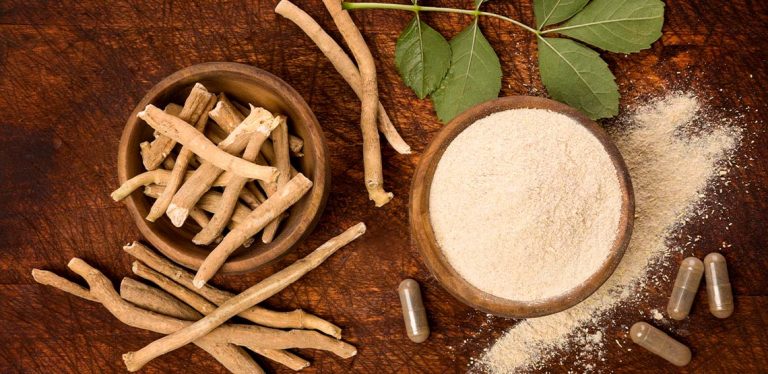What Are Adaptogens?
If you aren’t familiar with adaptogens, you are not alone. So, what are adaptogens? They’ve been around since the 1940s, but I heard about them for the first time a few years ago, and I am a health professional.
Adaptogens are active ingredients found in certain plants, like herbs and mushrooms that may help your body adapt to stress, anxiety, depression, insomnia, sleep disorders and fatigue.
Adaptogens are thought to help our bodies return to a state of homeostasis or a state of balance. Our bodies prefer to be in this state but outside exposure to external stressors (like stress, lack of sleep, anxiety, inflammation, etc.) can throw off that balance.
So, if certain hormones in your body are higher or lower than they should be, like higher levels of cortisol when you are stressed, certain adaptogens may help balance out those hormones.
Adaptogens are available in different forms including pills, dried powders you mix in food or fluids, teas and tinctures.
What Are the Benefits?
Adaptogens are commonly used in ayurvedic and traditional Chinese medicine, however they are not yet used in western medicine. Hundreds of studies have been conducted on adaptogens, and some have been studied more thoroughly than others.
Improvements in stress levels and fatigue appear to be the most common, evidence-based health benefits from adaptogens.
Who Should Use Adaptogens?
If the potential health claims turn out to be true, then everyone these days could likely benefit from using adaptogens. Based on the research, it appears taking adaptogens are likely safe for healthy individuals when the recommended dosages are followed, but the benefits they tout may or may not be as advertised.
I should also note that some adaptogens may interact with some medications, so they may not be safe for certain people. Additionally, there isn’t enough research done on pregnant and breastfeeding people, so adaptogen aids are not recommended for these groups.
Types of Adaptogens
There are upwards of 70 different adaptogens, and thousands of options once you can consider brands, formulations and dosages. Some are more common and well-studied than others.
There are three groups that adaptogens can fall under: mushrooms, herbs or foods.
Let’s look at the most common eight adaptogens that are currently on the market.
1. Ashwagandha
Probably the most well-known and well-studied adaptogen is ashwagandha, also known as Indian ginseng, which is an herb that apparently smells like a horse.
Ashwagandha is often taken for its anti-anxiety and stress-relieving properties. Studies have shown that it may reduce symptoms of stress, resulting in better sleep and lower cortisol levels, which may subsequently improve body weight.
It’s most commonly sold as a liquid extract or powder, both of which can easily be added to tea, or another drink of choice.
2. Panax Ginseng
Also referred to as true ginseng because it is the most researched ginseng, it is native to China and Korea. The therapeutic effects of panax ginseng come from compounds taken from the dried roots of this herb.
This adaptogen is often taken for calmness and improving brain function and immunity. Unfortunately, there is not enough solid evidence yet to support these claims.
Related Search Topics (Ads)
3. American Ginseng
This is another herb, but this one is found in North America, and it is not to be confused with panax ginseng because they are different plants and are taken for different reasons.
People commonly take American ginseng to improve their immune system, reduce pain and inflammation, manage stress and prevent cold and flu symptoms.
Once again, there isn’t strong evidence to support most of these claims, although studies suggest it is possibly effective for upper airway infections.
4. Eleuthero
Also called Siberian ginseng, this is an herb historically found in Russia and Korea with adaptogen properties that may fight fatigue and improve focus.
Supplement forms are most commonly liquid extracts from the root and stems.
5. Holy Basil
Holy basial is another herb that has long been used in traditional Indian medicine. Also referred to as tulsi, this adaptogen is often taken for its supposed stress-reducing effects, liver protection and improved libido, although the evidence isn’t strong enough to support these claims yet. Extract from the leaves is how it is usually used.
6. Rhodiola Rosea
This is another herb with extensive studies suggesting positive results on its impact at reducing fatigue and burnout caused by periods of chronic stress and anxiety. The adaptogen properties are found in the root of the plant, and the stems can be used in cooking.
7. Astragalus Root
This herb has long been used in traditional Chinese medicine and is often combined with other herbs. It is thought to have a number of potential benefits from managing allergy symptoms to improving the immune system. It is also used topically as a way to promote blood flow leading to faster healing of wounds. While research has been done, the studies have been low quality, so more research is needed.
8. Cordyceps Mushrooms
This is the first and only adaptogen on our list that is classified as a mushroom. It’s touted to have anti-aging and stamina boosting effects, but studies involving humans are poor, therefore the verdict is still out on the actual benefits of this shroom.
The Bottom Line
Adaptogens have been used for centuries in other cultures, but the science supporting their supposed health claims is still out, making them a questionable addition to western medicine. If you are curious about introducing adaptogens to your health regime talk to your healthcare provider to see if they are right for you, and consider addressing the root cause of the health issue you are looking to improve before using a pill (or liquid extract) as a quick fix for your ailment.
Article Resources
- Tastylicious (Are "Adaptogens" a Real Thing? 25 Scientific Papers Reviewed)
- Cleveland Clinic (Adaptogens)
- Abbey's Kitchen (What Are Adaptogen Foods and Do They Reduce Stress?)
- Examine (Ashwagandha)
- Examine (Panax ginseng)
- MedlinePlus (American Ginseng)
- Examine (Eleutherococcus senticosus)
- Examine (Holy Basil)
- NIH (Astragalus)
- Examine (Cordyceps)

